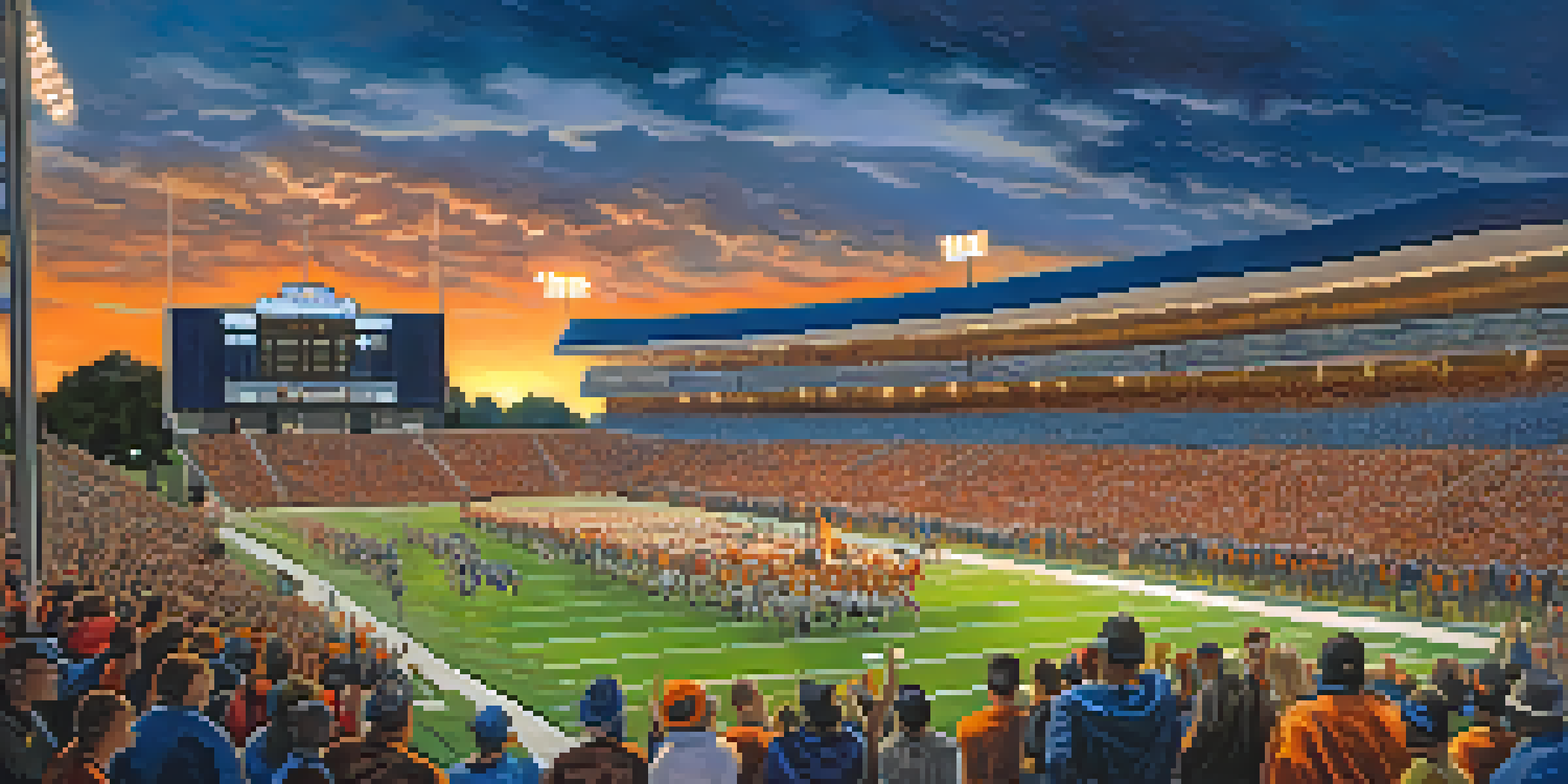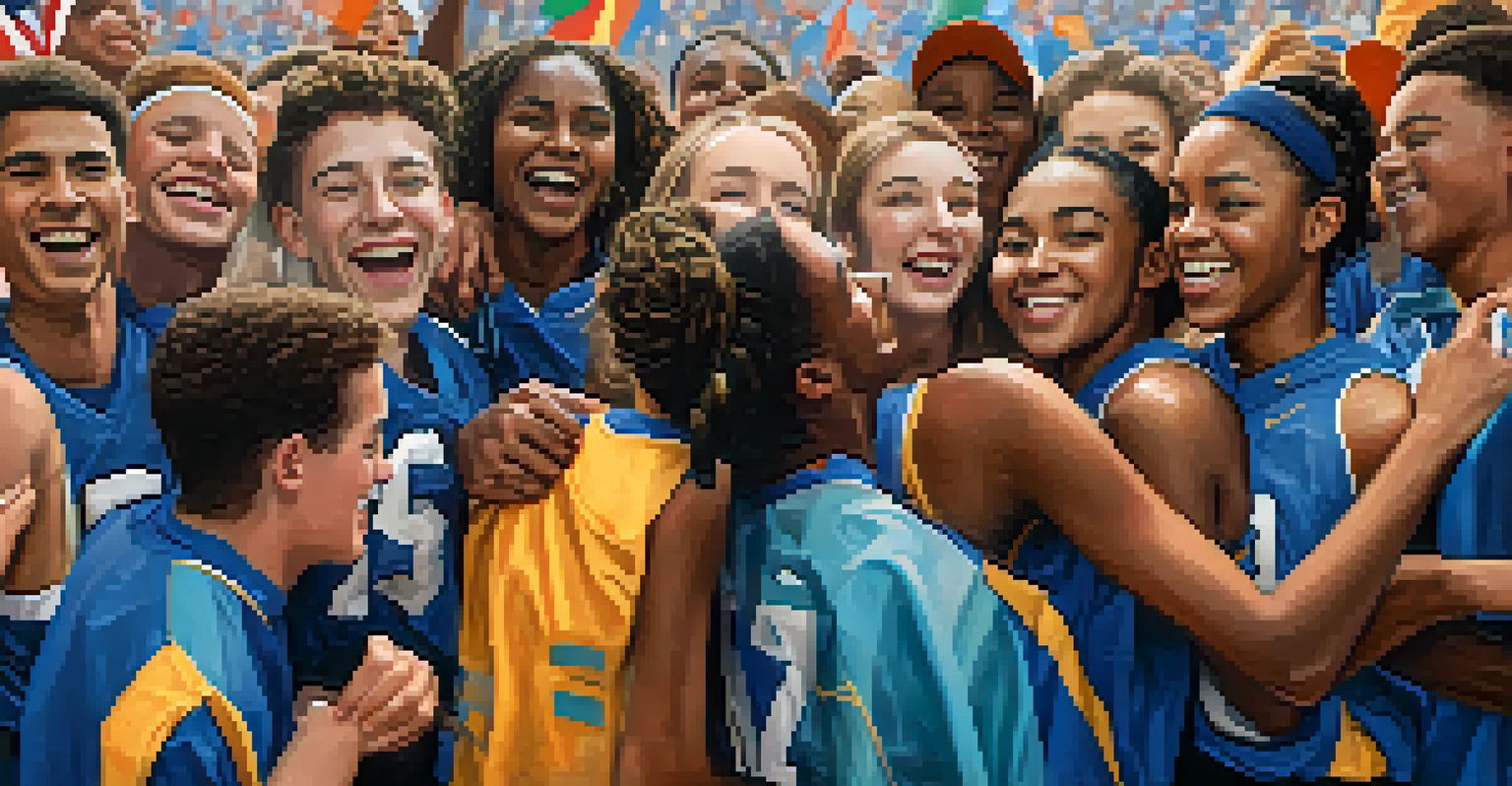The Role of High School Sports in North Carolina Communities

High School Sports: A Hub for Community Engagement
In North Carolina, high school sports serve as a focal point for community engagement, bringing together students, parents, and local residents. Friday night football games or weekend basketball tournaments often transform schools into vibrant social hubs. These events create a sense of belonging, as everyone rallies around their teams, fostering a spirit of camaraderie and pride.
Sports do not build character. They reveal it.
Moreover, the shared experience of cheering for local athletes can break down barriers, encouraging interaction among diverse groups. It’s not just about the game; it’s about the memories created in the stands, the friendships formed, and the local traditions that arise. This community spirit is a vital thread that weaves individuals together, reinforcing local identities.
As families gather to support their teams, local businesses often benefit from increased foot traffic, showcasing how sports can stimulate the economy. Concessions at games, merchandise sales, and local sponsorships all contribute to a thriving community atmosphere, highlighting the interconnectedness of sports and local culture.
Developing Lifelong Skills Through Sports
Participating in high school sports equips students with essential life skills that extend far beyond the playing field. Teamwork, discipline, and leadership are just a few of the attributes that athletes cultivate during their time in school sports. These qualities not only enhance their athletic performance but also prepare them for future challenges in college and the workforce.

Moreover, sports often teach students how to handle both success and failure, providing valuable lessons in resilience and perseverance. For instance, a team that loses a championship game learns to cope with disappointment, reflecting a crucial life lesson that setbacks are part of the journey. This growth mindset fosters a sense of maturity and emotional intelligence among young athletes.
Community Engagement Through Sports
High school sports in North Carolina unite students, families, and local residents, fostering a sense of belonging and community pride.
As students navigate the pressures of competition, they also learn the importance of time management. Balancing academics and sports requires dedication, helping them prioritize tasks and develop a strong work ethic. These skills are vital as they transition into adulthood, proving that the benefits of high school sports extend well into their future.
Encouraging Healthy Lifestyles Among Youth
High school sports in North Carolina also promote fitness and healthy lifestyles among youth. With rising concerns about childhood obesity and sedentary habits, sports provide an outlet for physical activity that is both enjoyable and beneficial. Regular participation in sports fosters a habit of exercise, encouraging students to stay active throughout their lives.
The greatness of a community is most accurately measured by the compassionate actions of its members.
Additionally, being part of a sports team often instills a sense of accountability. Athletes learn that their performance directly impacts their teammates, motivating them to maintain a healthy lifestyle. This collective responsibility can lead to better nutritional choices and a commitment to overall wellness.
Furthermore, schools often incorporate sports as part of their physical education curriculum, emphasizing the importance of physical activity in daily life. By prioritizing sports, communities send a clear message about the value of health, encouraging students to engage in activities that promote their well-being.
Unifying Diverse Communities Through Sports
In a state as diverse as North Carolina, high school sports serve as a unifying force that brings together individuals from different backgrounds. Sporting events create opportunities for cultural exchange and understanding, as fans and players celebrate their unique identities while supporting a common cause. This blend of cultures can lead to enriching experiences both on and off the field.
For example, multicultural sporting events may showcase various traditions, foods, and customs, fostering a greater appreciation for diversity within the community. This not only enhances the overall experience of attending games but also helps bridge gaps between different groups, creating a more inclusive environment.
Life Skills from Athletic Participation
Engaging in high school sports equips students with essential life skills such as teamwork, resilience, and time management that benefit them beyond the field.
As students participate in team sports, they learn to work alongside individuals who may have different perspectives or life experiences. This collaboration nurtures empathy and respect, essential qualities for building strong, cohesive communities. Through sports, North Carolina’s youth are not just competing; they are building friendships that transcend cultural boundaries.
Providing Pathways to Scholarships and Education
High school sports often serve as a launching pad for students seeking college scholarships, particularly for those from underrepresented backgrounds. Many athletes find that their talents on the field or court open doors to higher education opportunities that may have otherwise been inaccessible. This can be a game changer for students and their families, providing a pathway to a brighter future.
Schools and coaches play a crucial role in guiding student-athletes through the recruitment process. They help students navigate the complexities of scholarship applications, ensuring they highlight their academic and athletic achievements. By emphasizing the importance of both education and sports, these mentors prepare students for the demands of college life.
Moreover, the emphasis on academic performance among athletes further reinforces the connection between sports and education. Many programs require students to maintain a certain GPA to remain eligible to compete, promoting a culture of academic excellence alongside athletic prowess. This dual focus not only benefits individual athletes but also uplifts the entire school community.
Building Character and Sportsmanship in Young Athletes
Character development is a fundamental aspect of high school sports in North Carolina. Coaches and mentors emphasize the importance of sportsmanship, respect, and integrity, teaching young athletes to value fair play and ethical behavior. These lessons are crucial as they shape not just skilled players but also responsible citizens.
By participating in competitive sports, students learn to handle victory with humility and defeat with grace. Celebrating their own accomplishments while appreciating the efforts of opponents fosters an attitude of respect that extends beyond the playing field. This spirit of sportsmanship is a valuable trait that young athletes carry into their adult lives.
Pathways to Education and Growth
High school athletics provide students, especially from underrepresented backgrounds, with scholarship opportunities that can lead to higher education and personal development.
Furthermore, high school sports often present opportunities for community service and leadership roles, encouraging athletes to give back. Whether organizing charity events or volunteering as coaches for younger teams, students learn the importance of contributing positively to their communities. This sense of responsibility nurtures a generation of leaders dedicated to making a difference.
Strengthening School Spirit and Identity
High school sports are integral to building school spirit and identity in North Carolina. The excitement surrounding games and events fosters a sense of pride among students, faculty, and alumni. This shared enthusiasm creates memories that last a lifetime, strengthening the bond between individuals and their school community.
Cheering for school teams cultivates a unique culture that celebrates accomplishments, whether big or small. It’s not uncommon to see students donning school colors or painting faces for game day, showcasing their dedication and pride. This visible support adds to the overall atmosphere, creating a feeling of unity that extends beyond the sports themselves.

Moreover, successful sports programs can enhance a school's reputation, attracting new students and fostering a positive image in the community. When schools are known for their athletic achievements, it can lead to increased enrollment and support, creating a cycle of growth and pride that benefits everyone involved.